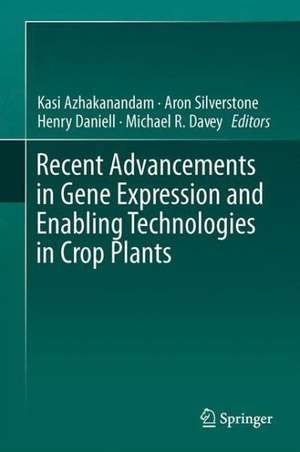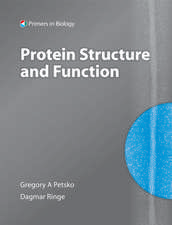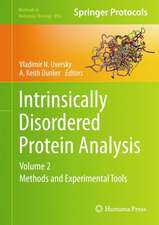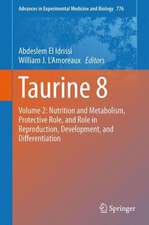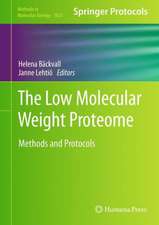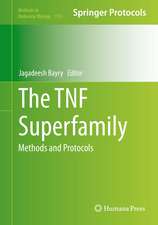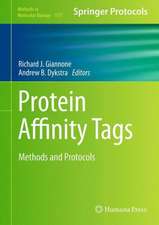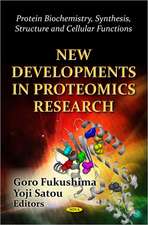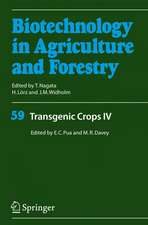Recent Advancements in Gene Expression and Enabling Technologies in Crop Plants
Editat de Kasi Azhakanandam, Aron Silverstone, Henry Daniell, Michael R. Daveyen Limba Engleză Hardback – 3 mar 2015
This book has three sections that encompass knowledge on genetically modified (GM) food crops that are currently used by consumers, those that are anticipated to reach the market place in the near future and enabling technologies that will facilitate the development of next generation GM crops. Section I focuses only on genetically modified maize and soybean (3 chapters each), while Section II discusses the GM food crops rice, wheat, sorghum, vegetables and sugar cane. Section III covers exciting recent developments in several novel enabling technologies, including gene targeting, minichromosomes, and in planta transient expression systems.
| Toate formatele și edițiile | Preț | Express |
|---|---|---|
| Paperback (1) | 953.35 lei 6-8 săpt. | |
| Springer – 4 oct 2016 | 953.35 lei 6-8 săpt. | |
| Hardback (1) | 959.50 lei 6-8 săpt. | |
| Springer – 3 mar 2015 | 959.50 lei 6-8 săpt. |
Preț: 959.50 lei
Preț vechi: 1170.12 lei
-18% Nou
Puncte Express: 1439
Preț estimativ în valută:
183.65€ • 191.00$ • 153.90£
183.65€ • 191.00$ • 153.90£
Carte tipărită la comandă
Livrare economică 13-27 martie
Preluare comenzi: 021 569.72.76
Specificații
ISBN-13: 9781493922017
ISBN-10: 1493922017
Pagini: 594
Ilustrații: XXIV, 455 p. 55 illus., 39 illus. in color.
Dimensiuni: 155 x 235 x 30 mm
Greutate: 0.85 kg
Ediția:2015
Editura: Springer
Colecția Springer
Locul publicării:New York, NY, United States
ISBN-10: 1493922017
Pagini: 594
Ilustrații: XXIV, 455 p. 55 illus., 39 illus. in color.
Dimensiuni: 155 x 235 x 30 mm
Greutate: 0.85 kg
Ediția:2015
Editura: Springer
Colecția Springer
Locul publicării:New York, NY, United States
Public țintă
ResearchCuprins
Maize Protein Expression.- Plant Trait Gene Expression Cassette Design.- Strategies to Maximize Recombinant Protein Expression in Maize Kernels.- Breeding and Biotech Approaches Towards Improving Yield in Soybean.- Herbicide Tolerance.- Towards Using Biotechnology to Modify Soybean Seeds as Protein Bioreactors.- Strategies to Increase Heterologous Protein Expression in Rice Grains.- Wheat Biotechnology: Current Stattus and Future Prospects.- Sorghum Transformation: Achievements, Challenges, and Perspectives.- Biotechnology for Insect Pest Management in Vegetable Crops.- Enhancement of Sugar Yield by Introducing a Metabolic Sink in Sugarcane.- Zinc Finger Nuclease-Mediated Gene Targeting in Plants.- Enineered Minichromosome Technology in Plants.- In Planta Transient Expression Systems for Monocotyledonous Species.- Recent Advances in In Planta Transient Expression and Silencing Systems for Soybean using Viral Vectors.
Recenzii
Notă biografică
Kasi Azhakanandam
Kasi Azhakanandam earned his Bachelor, Master and M. Phil. Degrees in Biology from the University of Madras, India and a Ph.D. in Plant Biotechnology from the University of Nottingham, UK. He worked as a Guest Lecturer at Madras Christian College for a short period before joining Mahyco, India, as a Deputy Chief Scientist/Principal Investigator, where he established a crop transformation laboratory. He lead a team which established transformation in commercial Indica rice, Indian cotton varieties and six different vegetable crops, including Bt eggplant; these are waiting for approval for commercial cultivation in India. He also successfully produced marker-free rice and vegetable crops. Following his postdoctoral work related to vaccine production for cervical cancer at North Carolina State University, Dr. Azhakanandam joined Syngenta Biotechnology, Inc., at Research Triangle Park, NC as a Staff Scientist III. He has worked on a range of projects to improve crops through genetic engineering, and currently leads a technical team for developing new traits for corn.
Aron Silverstone
Aron Silverstone gained a Bachelor’s Degree in Biology from Harvard University, and a Ph.D. in Plant Physiology from the University of California, Davis. He conducted his postdoctoral research at Duke University’s Department of Botany, studying gibberellin biosynthesis and response. Following his postdoctoral work, Dr. Silverstone joined Syngenta Biotechnology, Inc., at Research Triangle Park, NC as a Staff Scientist I. He has worked on several projects to improve crops through genetic engineering, and is currently the global project manager for soybean traits.
Henry Daniell
Henry Daniell, received his education in India, and is currently a Professor and Director of Translational Research at the University of Pennsylvania. He is a Fellow of the American Association for the Advancement of Science and a foreign member of the Italian National Academy of Sciences (14th American to be inducted in the past 230 years). He is the Editor in Chief of the Plant Biotechnology Journal, Oxford, UK. Dr. Daniell is the recipient of several awards, including the American Diabetes Association Award, Bayer Hemophilia Global Award, and Bill and Melinda Gates Foundation Award, for his scientific contributions. He is recognized for pioneering chloroplast genetic engineering as a new platform to produce and deliver orally low cost vaccines and biopharmaceuticals bioencapsulated in plant cells. His invention was ranked by Nature Biotechnology among the top ten inventions of the past decade and among Biomed Central’s Hot 100 authors in the world. He has more than 150 published patents and over 200 scientific publications.
Michael R. Davey
Michael Davey has a B.Sc. Honours Degree in Botany from University College, Swansea, Wales, and a Ph.D. from the University of Leicester, UK. In 1970, he was appointed to a research position at the University of Nottingham, UK where he continued his work on plant ultrastructure and gene transfer techniques. He has published extensively on plant cell culture and genetic engineering, and holds an Honorary Lectureship in the School of Biosciences, University of Nottingham.
Kasi Azhakanandam earned his Bachelor, Master and M. Phil. Degrees in Biology from the University of Madras, India and a Ph.D. in Plant Biotechnology from the University of Nottingham, UK. He worked as a Guest Lecturer at Madras Christian College for a short period before joining Mahyco, India, as a Deputy Chief Scientist/Principal Investigator, where he established a crop transformation laboratory. He lead a team which established transformation in commercial Indica rice, Indian cotton varieties and six different vegetable crops, including Bt eggplant; these are waiting for approval for commercial cultivation in India. He also successfully produced marker-free rice and vegetable crops. Following his postdoctoral work related to vaccine production for cervical cancer at North Carolina State University, Dr. Azhakanandam joined Syngenta Biotechnology, Inc., at Research Triangle Park, NC as a Staff Scientist III. He has worked on a range of projects to improve crops through genetic engineering, and currently leads a technical team for developing new traits for corn.
Aron Silverstone
Aron Silverstone gained a Bachelor’s Degree in Biology from Harvard University, and a Ph.D. in Plant Physiology from the University of California, Davis. He conducted his postdoctoral research at Duke University’s Department of Botany, studying gibberellin biosynthesis and response. Following his postdoctoral work, Dr. Silverstone joined Syngenta Biotechnology, Inc., at Research Triangle Park, NC as a Staff Scientist I. He has worked on several projects to improve crops through genetic engineering, and is currently the global project manager for soybean traits.
Henry Daniell
Henry Daniell, received his education in India, and is currently a Professor and Director of Translational Research at the University of Pennsylvania. He is a Fellow of the American Association for the Advancement of Science and a foreign member of the Italian National Academy of Sciences (14th American to be inducted in the past 230 years). He is the Editor in Chief of the Plant Biotechnology Journal, Oxford, UK. Dr. Daniell is the recipient of several awards, including the American Diabetes Association Award, Bayer Hemophilia Global Award, and Bill and Melinda Gates Foundation Award, for his scientific contributions. He is recognized for pioneering chloroplast genetic engineering as a new platform to produce and deliver orally low cost vaccines and biopharmaceuticals bioencapsulated in plant cells. His invention was ranked by Nature Biotechnology among the top ten inventions of the past decade and among Biomed Central’s Hot 100 authors in the world. He has more than 150 published patents and over 200 scientific publications.
Michael R. Davey
Michael Davey has a B.Sc. Honours Degree in Botany from University College, Swansea, Wales, and a Ph.D. from the University of Leicester, UK. In 1970, he was appointed to a research position at the University of Nottingham, UK where he continued his work on plant ultrastructure and gene transfer techniques. He has published extensively on plant cell culture and genetic engineering, and holds an Honorary Lectureship in the School of Biosciences, University of Nottingham.
Textul de pe ultima copertă
In the past two decades, agricultural biotechnology has had a major impact on farming, with genetically modified (GM) crops grown on more than 175 million hectares globally. Although plant biotechnology has exploited model systems to gain fundamental knowledge, parallel research on field-grown plants has facilitated the development of GM crops that are used by consumers today. Biotechnology has also helped to create a rich pipeline of future products. This volume focuses on the innovations in both applied and basic research that are advancing our ability to deliver more complex multi-gene traits into plants. Although much of the work to date has been on corn and soybean, other areas of active transgenic development include rice, wheat, sorghum, sugarcane and vegetable crops. There is a progression from the use of constitutive promoters and single traits to gene stacking, the design of transgene cassettes to more resemble native genes, the subcellular location of recombinant proteins, and manipulating storage tissues to achieve optimal performance. Herbicide tolerance and insect control have been and will continue to be highly desired traits. The future holds promise for novel modes of action to overcome current limitations. Targets for engineered recombinant proteins go beyond agronomic traits and focus on industrial or pharmaceutical uses, yield and nutrition enhancement. Undoubtedly, future farming will advance from food/feed to industrial products, making crops more rewarding with value added traits. Soon, even more sophisticated tools, including precision insertion or editing of genes and building novel chromosomes, will increase our ability to overcome current barriers in gene expression technology and facilitate rapid regulatory approval. The use of transient expression systems for crop plants will facilitate rapid evaluation of transgenes in crop plants. This book highlights a wide range of current research tools and enabling technologies to improve crop plants, with special emphasis on next generation approaches for engineering complex traits and value added products that will revolutionize the future of agriculture to meet the ever increasing global demand for food, feed, fuel and industrial products.
Caracteristici
Highlights examples of technologies successfully used in diverse crop plants. Review articles from leading scientists in academia and industry describe the latest research and development in expressing heterologous proteins in crop plants to introduce novel traits or useful products Serves as a reference for implemented enabling technologies as well as the potential for the next generation of cutting edge technologies Includes supplementary material: sn.pub/extras
